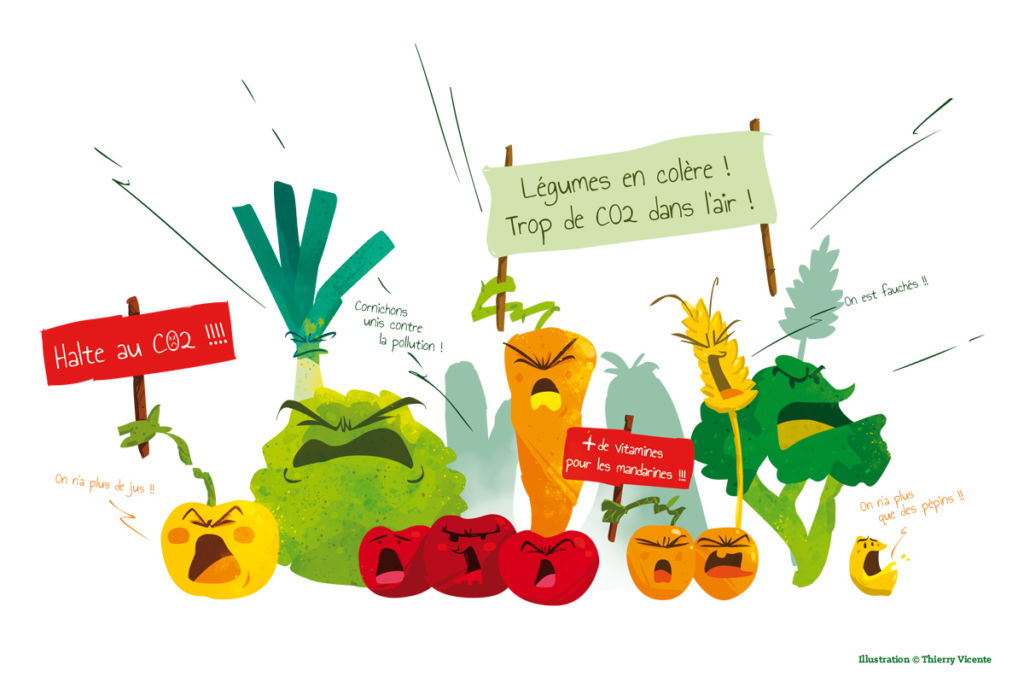[LUM#9] What if plants no longer fed us?
"Eat five fruits and vegetables a day." A slogan that could well become outdated in the coming years. The reason? The deterioration of the nutritional quality of plants due to the increase in CO2 concentration in the atmosphere. This phenomenon is still poorly understood, but researchers at the Montpellier Laboratory of Plant Biochemistry and Molecular Physiology.

"In 50 years, the increase in CO2 levels, which we can no longer control, will probably significantly boost agricultural production, but these crops will be of lower nutritional quality." This is the alarming conclusion shared by Alain Gojon, a researcher at the Laboratory of Plant Biochemistry and Molecular Physiology.
A global food challenge
Everything had started so well. For once, the increase in CO2 concentration in the atmosphere caused by human activity and responsible, among other things, for global warming, had a positive effect. It stimulated the growth of many plant species by boosting their photosynthesis. "Photosynthesis," explains Alain Gojon, "is the ability of plants to make sugars from CO2, light, and water. It is the basis of the food chain of life."
Since the 1990s, researchers have seen this as a twofold opportunity: to boost global food production while capturing excess CO2. "It's one of the possible solutions to the food challenge facing the planet, " says Alain Gojon. "There will be 9 billion people on Earth in 2050, and more than 10 billion by the end of the century. We're going to have to feed everyone." Initial calculations based on projected CO2 increases predict a 40% rise in agricultural production . A windfall.
Less minerals but more sugar
More than 2,600 experiments have been conducted to test this prediction. These experiments, known as FACE ( free air CO2 enrichment), involve creating an artificial CO2 bubble over crops in open fields using a system of nozzles that continuously inject carbon dioxide. Hundreds of plant species, including wheat, tomatoes, rice, potatoes, and beans, have been tested around the world. "The first publications appeared in 1998, but it is only in the last three or four years that we have had summaries of all these experiments." Two conclusions have emerged.
Firstly, the increase in agricultural productivity, which was ultimately much lower than researchers had hoped."We're closer to 10% than 40%," says Alain Gojon. The second, unexpected finding is the significant loss of minerals and proteins in plants grown under CO2: "The loss of nitrogen, which is a major component of proteins, is around 15%. For minerals such as phosphorus, potassium, calcium, magnesium, and iron, the loss is less than 10%."
Recent studies on rice varieties even report vitamin losses of up to 40%. On the other hand, there is more sugar because the carbon content is increased.
Serious health consequences
Within fifty years, commonly consumed plants could therefore be richer in energy but poorer in essential nutrients, with potentially serious consequences for the human population.
"A recent study indicates that, globally, an additional 120 million people will suffer from protein deficiency, and an additional 1.5 billion women and children will suffer from severe anemia due to iron deficiency." Once again, it is the South that will pay the highest price. " In the North, " the researcher continues, "nutritional imbalance could lead to an increase in obesity and overweight due to the higher sugar content of plants." To better understand this phenomenon, the QualiSud laboratory will analyze changes in the nutritional quality of foods produced under high CO2 levels in order to measure their impact on human health.
This process may already be underway, as researchers have found that when comparing contemporary wild plants with samples taken from herbariums dating back to the pre-industrial era, the mineral content of the same species is already lower. " The problem, " continues Alain Gojon, "is that nothing we currently know about the physiology of plant mineral nutrition allows us to explain this." And this is precisely the focus of the research that will begin in Montpellier in January 2019.
Two hypotheses
"The first hypothesis is that, for reasons we do not understand, the increase in CO2 affects how plants function, making them less efficient at extracting minerals from the soil. The second hypothesis, which will be investigated by the Eco&Sol laboratory in Montpellier in collaboration with Alain Gojon's team , is that "CO2 could have an effect on the functioning of the biogeochemical cycles of elements in the soil. The idea is that plants may still be functioning just as well, but that there are fewer minerals available to them in the soil."
By testing these hypotheses, researchers hope to understand this mechanism and perhaps also find solutions to this future crisis. "Thanks to the unique facilities availableat the Ecotron in Montpellier, we will use 140 plant lines and try to identify the genetic determinants of the negative impact of high CO2 on the nutritional quality of plants,"said
.The hope is to produce plant varieties that are less affected by the increase in CO2.
Find UM podcasts now available on your favorite platform (Spotify, Deezer, Apple Podcasts, Amazon Music, etc.).